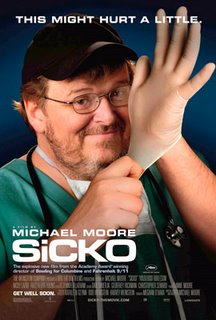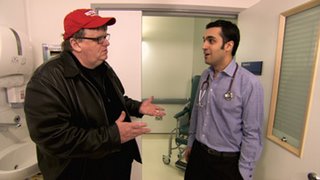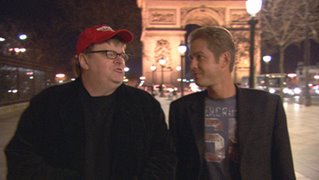Sicko
 I think it's pretty much an understatement to claim that Michael Moore is the most polarizing figure in films today. Love him or hate him, there's really no in-between. I have always found his films one-sided, no matter what subject his current film was tackling. Whether it be gun control (Bowling for Columbine), unemployment (Roger and Me, his debut film) or the President (Fahrenheit 9/11), Moore has always aimed the camera directly at his personal view points and gone full-tilt, not even bothering to show the other side of the story. And yet, I also can't deny that the man is a great entertainer. He is able to combine humor and facts (and a large number of half-facts, if his critics are to be believed) in such a way that even if I don't agree with him, I usually have a good time listening to him.
I think it's pretty much an understatement to claim that Michael Moore is the most polarizing figure in films today. Love him or hate him, there's really no in-between. I have always found his films one-sided, no matter what subject his current film was tackling. Whether it be gun control (Bowling for Columbine), unemployment (Roger and Me, his debut film) or the President (Fahrenheit 9/11), Moore has always aimed the camera directly at his personal view points and gone full-tilt, not even bothering to show the other side of the story. And yet, I also can't deny that the man is a great entertainer. He is able to combine humor and facts (and a large number of half-facts, if his critics are to be believed) in such a way that even if I don't agree with him, I usually have a good time listening to him. His latest film, Sicko, tackles the issue of health care in the United States, compared to abroad. Everyone pretty much knows what to expect walking into the theater, and Moore delivers on all counts. And yet, at the same time, Sicko presents a somewhat softer Moore as well. The movie is not so much focused on him, but rather on the stories of the people he talks to. He doesn't seem to be aiming for his own personal agenda this time around, but rather seems to be doing a side-by-side investigation, and letting the story tell itself. Yes, the movie is just as one-sided as all of his other pieces of work. And a last minute stunt that he pulls during the final half hour of the film had me rolling my eyes a little. That being said, this is probably Moore's easiest film to like to date, because it deals with a problem that is very real and effects just about everyone, not just his own personal opinion on a topic.
His latest film, Sicko, tackles the issue of health care in the United States, compared to abroad. Everyone pretty much knows what to expect walking into the theater, and Moore delivers on all counts. And yet, at the same time, Sicko presents a somewhat softer Moore as well. The movie is not so much focused on him, but rather on the stories of the people he talks to. He doesn't seem to be aiming for his own personal agenda this time around, but rather seems to be doing a side-by-side investigation, and letting the story tell itself. Yes, the movie is just as one-sided as all of his other pieces of work. And a last minute stunt that he pulls during the final half hour of the film had me rolling my eyes a little. That being said, this is probably Moore's easiest film to like to date, because it deals with a problem that is very real and effects just about everyone, not just his own personal opinion on a topic. The entire first half of the film is devoted to various stories about American families struggling to live because they were either denied insurance, or because they were forced to make severe sacrifices for their insurance. Some of these stories are downright horrifying, particularly when Moore introduces us to a man who had two of his middle fingers sawed off in a power tool accident. At the hospital, the man was given a choice of which finger he would like re-attached. One finger cost more than the other. The fact that this man had to make such a choice is disgusting enough, but when you consider that the cost of attaching each finger was set at $12,000 and $60,000 individually, it's bound to make just about every mouth in the theater drop simultaneously. Other stories include a middle aged couple who are forced to move into their adult daughter's basement because they can no longer afford to live on their own due to medical bills, and an elderly man close to hitting 80 who is forced to work jobs so that he can afford medication for both him and his wife. Rather than letting the spotlight be on himself, Moore wisely mainly stays silent during these scenes, other than setting up who we're listening to in narration, and lets the people tell their own story. These moments are heartbreaking, and often quite moving without being manipulative. We also meet some people who either work for or have worked for insurance companies. They talk about how they are encouraged by their superiors to deny just about every claim that comes in, or to go back and look for any sort of loophole that will allow the company to get out of it if a claim is approved.
The entire first half of the film is devoted to various stories about American families struggling to live because they were either denied insurance, or because they were forced to make severe sacrifices for their insurance. Some of these stories are downright horrifying, particularly when Moore introduces us to a man who had two of his middle fingers sawed off in a power tool accident. At the hospital, the man was given a choice of which finger he would like re-attached. One finger cost more than the other. The fact that this man had to make such a choice is disgusting enough, but when you consider that the cost of attaching each finger was set at $12,000 and $60,000 individually, it's bound to make just about every mouth in the theater drop simultaneously. Other stories include a middle aged couple who are forced to move into their adult daughter's basement because they can no longer afford to live on their own due to medical bills, and an elderly man close to hitting 80 who is forced to work jobs so that he can afford medication for both him and his wife. Rather than letting the spotlight be on himself, Moore wisely mainly stays silent during these scenes, other than setting up who we're listening to in narration, and lets the people tell their own story. These moments are heartbreaking, and often quite moving without being manipulative. We also meet some people who either work for or have worked for insurance companies. They talk about how they are encouraged by their superiors to deny just about every claim that comes in, or to go back and look for any sort of loophole that will allow the company to get out of it if a claim is approved. After this, Moore starts traveling abroad, trying to compare foreign countries health plans to ours at home. He visits Canada, England, and France only to learn some rather shocking information about how much better they supposedly have it. We see medication being sold for rock bottom prices in Canada. We see people bragging about how hospital visits don't cost a thing in London, England. Heck, he introduces us to a British cashier whose job is not to collect money from patients at the hospital, but rather is to hand it out. In France, we learn about how the government pays for basic necessities like laundry and nanny service to working mothers. All of this is enough to make just about anyone in the audience hop on the next flight overseas. And yet, as is often the case with Moore, we don't feel like we're getting the entire story. We never get to hear the other side of the story. When he is interviewing employees of US Health Care companies, he only interviews the disatisfied employees, not those who represent the company's ideals. He should have tried to make a balance between both sides, even if he thinks the other side is wrong. I expect one-sidedness with Moore, but at the same time, I found it hard to swallow that everything is wine and roses overseas, which is what Sicko would want us to believe. Do I think people in Canada have it better than us in a lot of ways when it comes to medicine and insurance costs? Absolutely. But, I also think that Moore does not dig deep enough into his own subject, and only skims the surface.
After this, Moore starts traveling abroad, trying to compare foreign countries health plans to ours at home. He visits Canada, England, and France only to learn some rather shocking information about how much better they supposedly have it. We see medication being sold for rock bottom prices in Canada. We see people bragging about how hospital visits don't cost a thing in London, England. Heck, he introduces us to a British cashier whose job is not to collect money from patients at the hospital, but rather is to hand it out. In France, we learn about how the government pays for basic necessities like laundry and nanny service to working mothers. All of this is enough to make just about anyone in the audience hop on the next flight overseas. And yet, as is often the case with Moore, we don't feel like we're getting the entire story. We never get to hear the other side of the story. When he is interviewing employees of US Health Care companies, he only interviews the disatisfied employees, not those who represent the company's ideals. He should have tried to make a balance between both sides, even if he thinks the other side is wrong. I expect one-sidedness with Moore, but at the same time, I found it hard to swallow that everything is wine and roses overseas, which is what Sicko would want us to believe. Do I think people in Canada have it better than us in a lot of ways when it comes to medicine and insurance costs? Absolutely. But, I also think that Moore does not dig deep enough into his own subject, and only skims the surface. The last half of the film is when Sicko suffers the most, because here is where Moore starts relying on theatrics and stunts to get his point across. He hears about how terrorist suspects being held at government prisons are given better health care than US citizens, so he gathers up some people who served as rescue workers on September 11th, and have been suffering health problems from working in the conditions at Ground Zero since that time 6 years ago. He gathers them on a boat, and tries to talk to the people within, asking for free medical care for these US people. While his intentions are noble, the whole thing just screams of desperation, and is about as subtle as a sledgehammer to the noggin. The earlier scenes when Moore is simply letting the people tell their stories is when Sicko is at its strongest. When Moore himself hijacks the film, and starts taking these people to Cuba for cheap meds and hospital visits, his personal ego drowns out his best efforts. The movie remains strong throughout, and is always quite eye-opening. I just liked it better when he was telling the story, and not being apart of it. It becomes especially off-putting at the end when Moore turns his own generosity for another person into a sickening display of self-centeredness and almost mockery. It ends the film on completely the wrong note, and leaves us walking out of the theater thinking about him rather than the stories he was supposed to be telling.
The last half of the film is when Sicko suffers the most, because here is where Moore starts relying on theatrics and stunts to get his point across. He hears about how terrorist suspects being held at government prisons are given better health care than US citizens, so he gathers up some people who served as rescue workers on September 11th, and have been suffering health problems from working in the conditions at Ground Zero since that time 6 years ago. He gathers them on a boat, and tries to talk to the people within, asking for free medical care for these US people. While his intentions are noble, the whole thing just screams of desperation, and is about as subtle as a sledgehammer to the noggin. The earlier scenes when Moore is simply letting the people tell their stories is when Sicko is at its strongest. When Moore himself hijacks the film, and starts taking these people to Cuba for cheap meds and hospital visits, his personal ego drowns out his best efforts. The movie remains strong throughout, and is always quite eye-opening. I just liked it better when he was telling the story, and not being apart of it. It becomes especially off-putting at the end when Moore turns his own generosity for another person into a sickening display of self-centeredness and almost mockery. It ends the film on completely the wrong note, and leaves us walking out of the theater thinking about him rather than the stories he was supposed to be telling. If I seem to be trashing the film, I apologize. This really is an important movie that I do think needs to be seen. It tackles an important issue, and for at least most of its running time, does so in a way that does not seem desperate or forced. It's only during the final half-hour that Sicko loses its way, and turns into a self-congratulatory love letter to the filmmaker. Up till that point, this is one of the most important movies of the year, and is bound to get people more interested in Health Care. If it gets at least one person to look at their insurance companies in a different way, I think the film has done its job. I may not be a fan of some of his methods, but I have to admit, Moore makes a very good point with Sicko, and it's a point that everyone needs to hear.
If I seem to be trashing the film, I apologize. This really is an important movie that I do think needs to be seen. It tackles an important issue, and for at least most of its running time, does so in a way that does not seem desperate or forced. It's only during the final half-hour that Sicko loses its way, and turns into a self-congratulatory love letter to the filmmaker. Up till that point, this is one of the most important movies of the year, and is bound to get people more interested in Health Care. If it gets at least one person to look at their insurance companies in a different way, I think the film has done its job. I may not be a fan of some of his methods, but I have to admit, Moore makes a very good point with Sicko, and it's a point that everyone needs to hear.






0 Comments:
Post a Comment
<< Home